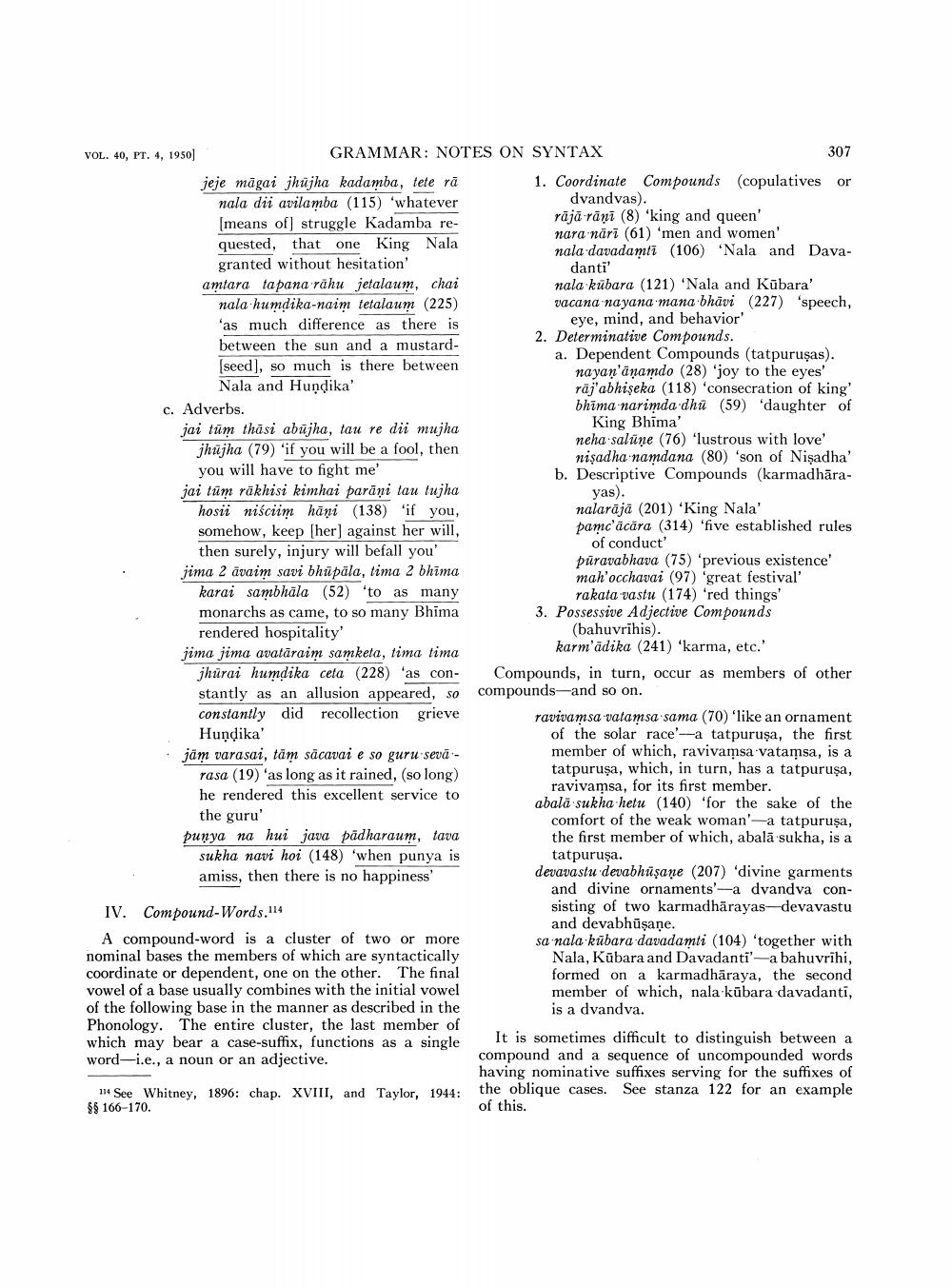________________
307
VOL. 40, PT. 4, 1950]
GRAMMAR: NOTES ON SYNTAX jeje māgai jhujha kadamba, tete rā
1. Coordinate Compounds (copulatives or nala dii avilamba (115) 'whatever
dvandvas).
rājā rāni (8) 'king and queen' means of] struggle Kadamba re
nara nārī (61) 'men and women' quested, that one King Nala
nala davadamti (106) 'Nala and Davagranted without hesitation
danti amtara tapana rahu jetalaum, chai
nala kübara (121) 'Nala and Kūbara' nala humdika-naim tetalaum (225)
vacana nayana mana bhavi (227) 'speech, as much difference as there is
eye, mind, and behavior
2. Determinative Compounds. between the sun and a mustard
a. Dependent Compounds (tatpuruşas). (seed), so much is there between
nayan'ānamdo (28) 'joy to the eyes' Nala and Hundika'
räj'abhişeka (118) 'consecration of king' c. Adverbs.
bhima narimda dhū (59) daughter of jai tüm thāsi abūjha, tau re dii mujha
King Bhima'
neha salune (76) 'lustrous with love' jhüjha (79) 'if you will be a fool, then
nişadha namdana (80) 'son of Nişadha' you will have to fight me'
b. Descriptive Compounds (karmadhārajai tüm rākhisi kimhai parāni tau tujha
yas). hosii niściim hāni (138) 'if you,
nalarāja (201) 'King Nala' somehow, keep [her] against her will,
pamc'ācāra (314) 'five established rules then surely, injury will befall you'
of conduct'
pūravabhava (75) 'previous existence jima 2 āvaim savi bhüpāla, tima 2 bhima
mah'occhavai (97) 'great festival' karai sambhāla (52) 'to as many
rakata vastu (174) 'red things' monarchs as came, to so many Bhima
3. Possessive Adjective Compounds rendered hospitality'
(bahuvrihis). jima jima avatāraim samketa, tima tima
karm'ādika (241) 'karma, etc. jhūrai humdika ceta (228) "as con- Compounds, in turn, occur as members of other stantly as an allusion appeared, so compounds-and so on. constantly did recollection grieve
ravivamsa vatamsa sama (70) 'like an ornament Hundika'
of the solar race--a tatpuruşa, the first jam varasai, tām sācavai e so guru sevä -
member of which, ravivamsa vatamsa, is a rasa (19) 'as long as it rained, (so long)
tatpuruşa, which, in turn, has a tatpuruşa, he rendered this excellent service to
ravivamsa, for its first member.
abala sukha hetu (140) 'for the sake of the the guru
comfort of the weak woman'-a tatpuruşa, punya na hui java pādharaum, tava
the first member of which, abalā sukha, is a sukha navi hoi (148) 'when punya is
tatpuruşa. amiss, then there is no happiness'
devavastu devabhūşane (207) 'divine garments
and divine ornaments'-a dvandva conIV. Compound-Words.114
sisting of two karmadhārayas-devavastu
and devabhūşaņe. A compound-word is a cluster of two or more
sa nala kūbara davadamti (104) 'together with nominal bases the members of which are syntactically
Nala, Kūbara and Davadanti'-a bahuvrihi, coordinate or dependent, one on the other. The final
formed on a karmadhāraya, the second vowel of a base usually combines with the initial vowel
member of which, nala kūbara davadanti, of the following base in the manner as described in the
is a dvandva. Phonology. The entire cluster, the last member of which may bear a case-suffix, functions as a single
It is sometimes difficult to distinguish between a word-i.e., a noun or an adjective.
compound and a sequence of uncompounded words
having nominative suffixes serving for the suffixes of 114 See Whitney, 1896: chap. XVIII, and Taylor, 1944: the oblique cases. See stanza 122 for an example $8 166-170.
of this.




